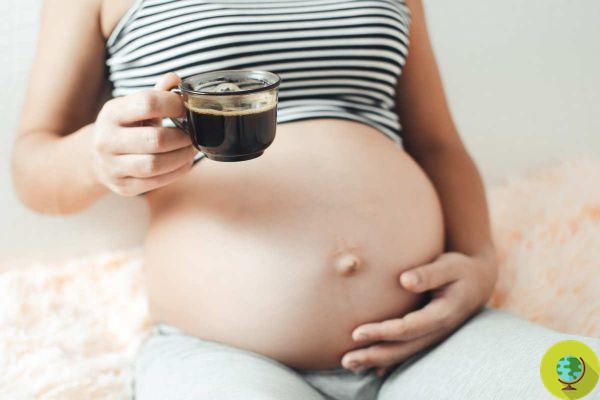
According to an analysis, caffeine consumption is linked to an increased likelihood of negative outcomes during the first months of pregnancy.
Don't store avocado like this: it's dangerousPregnant women or those trying to conceive should give up coffee, tea, sodas, and other sources of caffeine. According to a new study, in fact, this substance would harm pregnancy, as well as those who try to get pregnant.
According to the analysis of 48 studies, published in BMJ Evidence Based Medicine, the consumption of caffeine should be linked to a significant increase in the probability of negative outcomes during the first months of pregnancy, from low birth weight, to preterm birth, up to childhood obesity. In addition, there is no safe intake limit for pregnant women.
"The cumulative scientific evidence supports the contention that pregnant women and women contemplating pregnancy should be advised to avoid caffeine," says study author Jack James, a professor at Reykjavik University in Iceland.
The findings question current expert recommendations from organizations such as the NHS, the British National Health Service, the American College of Obstetricians and Gynecologists, the Dietary Guidelines for Americans and also for Efsa, the European Food Safety Authority. . These guidelines state that consuming a small amount of caffeine every day - not exceeding 200-300 milligrams - does not appear to harm the fetus.
EFSA: Drinking more than 4 coffees a day is bad, especially during pregnancy
A systematic review
Jack James analyzed 37 observational studies and 17 meta-analyzes published from 1998 to 2019 that link caffeine to at least one of six negative pregnancy outcomes: miscarriage, birth mortality, low birth weight or gestational age, preterm birth, acute leukemia and childhood obesity. As many as 32 of the 37 observational studies found that caffeine significantly increased the risk of a negative pregnancy outcome, while of the meta-analyzes, 14 indicated a risk of harm associated with maternal caffeine consumption, 4 a higher risk of miscarriage, 2 indicate higher risks of mortality at birth, 5 of low birth weight or gestational age, and 3 meta-analyzes suggest a higher risk of childhood leukemia.
James pointed out that all the data in the analysis comes from observational studies, which are not designed to establish cause and effect (in this case between caffeine intake and adverse outcomes in pregnancy or the health of the unborn child). As the author himself stated that there could be more factors capable of influencing the results: for example maternal smoking, just to name one.
But even considering everything, these results would be enough for the author to radically revise the recommendations on caffeine intake during pregnancy and to advise "pregnant women and those planning to become pregnant to avoid caffeine".
That said, there remains a more than vast scientific literature that places coffee in an active lifestyle and a correct and balanced diet. EFSA had recognized that caffeine exerts positive effects both on a mental level (alertness, concentration) and physical performance (endurance). Other evidence also suggests that moderate life-long coffee consumption can slow physiological age-related cognitive decline and reduce the risk of neurodegenerative diseases (such as Alzheimer's and Parkinson's disease), the risk of diabetes type 2 and a number of liver diseases.
As for pregnant women, the usual only recommendation remains: don't overdo it!
Source: BMJ / CNN
Read also:
- Coffee: 5 cups a day are not bad (but watch out for hidden caffeine)
- Coffee: good but not early in the morning or at lunchtime
- Health in a cup of coffee: 3 pros and 3 cons


























